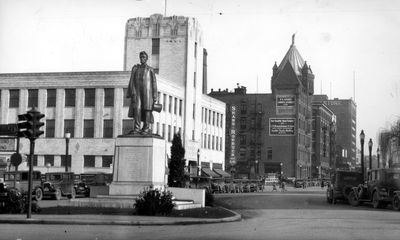Bicentennial events honor Lincoln’s life, legacy

Honest Abe, the Great Emancipator, holds an honored place in the heart of Spokane.
A bronze statue of the 16th president – depicting him as commander in chief of the Union Army – towers above the boulevard between the U.S. Courthouse and public library downtown. Its unveiling in 1930 drew 40,000 people in an outpouring of patriotism.
This Thursday, on the 200th anniversary of Abraham Lincoln’s birth, a delegation from the Esther Reed Chapter of the Daughters of the American Revolution will return to the Lincoln statue for a commemorative wreath-laying at noon.
America without Lincoln would be hard to imagine. His integrity, strength, compassion and humility define American leadership.
“We wouldn’t have the Union as we know it today,” said Christine Durkoop Olson, historian for the DAR in Spokane.
Lincoln was born on Feb. 12, 1809, and died on April 15, 1864.
The wreath-laying will be part of a month of Lincoln Bicentennial activities in Spokane.
Among educational activities, students in the West Valley School District are holding penny drives in elementary schools and studying slavery and race relations in middle and high schools.
West Valley is also teaming up with the Spokane Symphony to teach the lessons of Lincoln. Hundreds of the district’s students will view the national Lincoln teach-in at the Fox theater. The symposium later in the month is a collaboration of West Valley, the symphony and Lincoln scholars from Eastern Washington University. It is part of the district’s emerging emphasis on citizenship.
“We’re trying to create a continual awareness of what it means to be civically engaged,” said Assistant Superintendent Gene Sementi.
Students are focusing on two speeches – the dramatically short Gettysburg Address in 1863 and his Second Inaugural Address.
Lincoln’s 200th birthday, Sementi said, is “a wonderful opportunity to get our kids down into the Fox theater,” which itself is an important part of city history.
The symphony’s premiere performance of “Letters from Lincoln” elevates Spokane’s bicentennial observance to a national stage. It draws together the work of renowned composer Michael Daugherty with the vocals of Thomas Hampson, a Spokane native and leading opera singer in New York. Music director Eckart Preu chose Daugherty “because his music is rich with cultural and political allusions and bears the stamp of classic modernism.”
At the Chase Gallery at Spokane City Hall, six artists are showing pieces in a study of Lincoln’s legacy, including ink-on-clayboard panels by Whitworth University associate professor Scott Kolbo.
His drawings are taken from famous portraits and photographs of the Civil War era. A pair of panels shows the contemplative Lincoln juxtaposed with cotton-picking slaves.
“The country teetered on the brink of falling apart,” Kolbo said. “There was a lot of danger the country was going to split into a million different factions.”
The Gettysburg Address, in particular, showed Lincoln’s humility and grace during the darkness of the Civil War, Kolbo said.
That speech, honoring the Gettysburg battlefield dead, called for “a new birth of freedom” so that a nation “of the people, by the people and for the people shall not perish from the earth.”
Jerrelene Williamson, president of the Northwest Black Pioneers in Spokane, said Lincoln’s leadership “meant new beginning for black people” that has continued with the civil rights movement under Martin Luther King Jr. and the inauguration last month of President Barack Obama as the nation’s first black president.
Former U.S. Rep. George Nethercutt said he’s been studying Lincoln in recent months and considers him the greatest president.
“If the South had prevailed,” he said, “who knows what kind of country we would have been.”